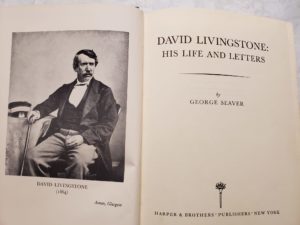
Another book that I recently read, just like the last one I reviewed, was one I have wanted to read and not keep. Like the last one, it’s a biography and I don’t remember where I got this. Unlike the last one, I knew a little about the subject: David Livingstone.
I knew something about him from various sources over the years, as well as from a short biography I’d read about him and reviewed on this blog.
This book is titled David Livingstone: His Life and Letters. Written by George Seaver and published in 1957, at 633 pages, it is much different than the last one I read on him. That one was popular; this one scholarly. That one did little more than give the basics; this one get deeper into Livingstone’s life.
Yes, David Livingstone was a headstrong, complex person, and the life he lived has much controversy in it. He found Christ as his savior in England while a young man, and felt a call to preach, but as a missionary. He went to South Africa under the auspices of the London Missionary Society. Livingstone married Mary Moffet, the daughter of the head of that mission, Rev. Robert Moffet.
Immediately on Livingstone’s arrival in South America, the problems began. He wanted to push farther into the interior of Africa than the mission was prepared for or had the money to do. He tended to fight for what he wanted, writing letters to people back in England, going above Moffat’s head to enlist help. Eventually, they moved his family further inland. Only a year or two passed when Livingstone wanted to push even further. He had determined that the best way to promote missions in Africa was to promote trade that would bring more Europeans there.
He fought for this, eventually won, and made a transit of south-central Africa, first to the west, then back to his starting point, then to the east. This trip, immortalized in his journal and other writings, brought him instant fame in Great Britain, and he was mobbed when he returned to England on furlough.
I could go on and on about how Livingstone became so fixated on the commerce thing that he eventually became an explorer, not a missionary. But this is a book review, not a mini-biography. One thing this book did that the other didn’t was point out Livingstone’s faults and controversial traits. Here are a few of them.
- The already mentioned headstrongness and tendency to think his way was the only way.
- The dragging his wife along on some of his explorations, to the detriment of her fragile health.
- His neglect of his children, who eventually were shipped back to England or Scotland and raised by others.
- The fact that his opening the continent to more trade also opened it to more slave trading. Livingstone was strongly against the slave trade, already outlawed by England but not by Portugal and several Moslem nations. Unwittingly, Livingstone helped facilitate the vile practice he wanted to eradicate.
- His essentially abandoning missions in favor of exploration.
As for the book, while being scholarly, it was actually easy reading. A handful of maps included were copies of maps Livingstone drew while on his journeys. While the authenticity was nice, I would have preferred having modern maps that showed the places better.
The text was a mixture of narrative and Livingstone’s letters and other writings. But the letters weren’t quoted in their entirety, but rather in limited extracts. As one who likes to read letters, this was a negative. Because of the length and limited daily reading time, it took me about two months to read it.
I give the book 4-stars, one star lost for how the letters were handled, the lack of readable maps, and…I don’t know, a sense that despite its comprehensive nature, at the end of the reading I felt like something was missing, something I couldn’t quite put my finger on. It’s well worth reading, however, if you can find it. I suspect other semi-scholarly biographies or David Livingstone are out there and would be better worth your time and money.
This is not a keeper. I wouldn’t mind reading more about the famous explorer one of these days, and even some of his own writings. But I won’t ever re-read this one. Into the donate/sale pile it goes.